精品课件-小学英语一般过去时
小学英语语法复习PPT课件(1)

小学英语语法
六、形容词和副词的比较级复习及练习
一、形容词的比较级
1、形容词比较级在句子中的运用:两个事物或人的比较用比 较级,比较级后面一般带有单词than。比较级前面可以用
more, a little 来修饰表示程度。than后的人称代词用主格
(口语中可用宾格)。 2.形容词加er的规则:
⑴一般在词尾加er ;
小学英语语法
4.以“f或fe”结尾,变f或fe为v, 再加-es, 如:knife-knives leaf——leaves 5.不规则名词复数: man-men, woman-women, child-children;foot-feet;tooth-teeth fish-fish, Chinese-Chinese, Japanese-Japanese
⑵以字母e 结尾,加r ;
⑶以1元音字母和1辅音字母结尾,应双写末尾的辅音字母, 再加er ; ⑷以“辅音字母+y”结尾,先把y变i,再加er 。
小学英语语法
3、不规则形容词比较级:good-better, beautifulmore beautiful 二、副词的比较级 1.形容词与副词的区别 (有be用形,有形用be;有 动用副,有副用动) ⑴在句子中形容词一般处于名词之前或be动词之后 ⑵副词在句子中最常见的是处于实义动词之后
小学英语语法
三、按照要求改写句子 1. Daniel watches TV every evening.(改为否定句) ___________________________________________________ 2. I do my homework every day.(改为一般疑问句,作否定回答) _____________________________________________________ ___ 3. She likes milk.(改为一般疑问句,作肯定回答) ___________________________ 4. We go to school every morning.(改为否定句) ___________________________________________________ 五、改错(划出错误的地方,将正确的写在横线上) 1. Is your brother speak English? __________________ 2. Does he likes going fishing? _________________ 3. He likes play games after class. _________________ 4. Mr. Wu teachs us English. __________________ 5. She don‟t do her homework on Sundays. _______________
小学英语一般过去时态讲解及习题ppt课件
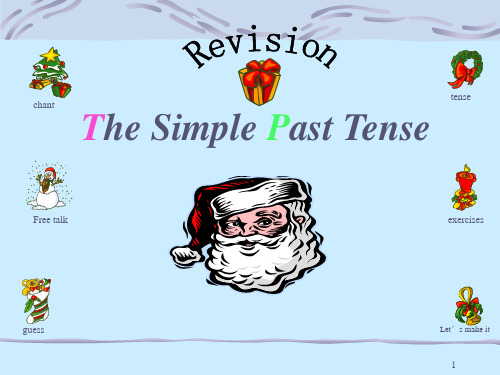
A: What day_i_s_ it today ? B: It _is_ Sunday. A: What day _w_a_s_it yesterday?B: It_w_a_s_Saturday. A: What day _w_a_s_ it the day before yesterday ?
39
It was sunny.
The vacations were great .
How was the weather ? How were the vacations ?
I did my homework yesterday.
What did you …do…?
She played soccer last Sunday.
Did they have…?
My father went to the beach three years ago.
Did your father go…?
Tom and Jack studied for the test three days
ago. Did Tom and Jack study…?
I did my homework yesterday.
Did you do…?
Sshe play…?
He cleaned his room last week.
Did he clean…?
They had a summer camp last weekend.
What did she …do…?
30
Exercise 1. _W_e_r_e_(be) you busy yesterday afternoon? 2. She _w__a_s _ (be) at school this morning. 3. Jane and Ann w__er_e_n_’(tbe not) friends before. 4. He _d_i_d_n_’(tdo not) live in Guangzhou
小学英语时态之 一般过去时讲解课件ppt

一般过去时:
定义: 一般过去时,是表示过去某一时刻或某一段时间内发生的动作或存在
的状态。
标志词: yesterday, just now, …ago, last…, this morning …
结构: 谓语是be动词
谓语是行为动词
肯定句: 主语+ was/were + 其他 否定句: 主语+ was/were + not + 其他 一般疑问句: Was/Were + 主语+其他? 肯定句: 主语+ 动词的过去式 + 其他 否定句: 主语+ didn’t +动词原形 + 其他 一般疑问句:Did + 主语+ 动词原形 +其他?
at the weekends this morning often
usually
last Mid-Autumn Festival
every day three days ago on Mondays
tomorrow a moment ago 14 years ago
找出表示一般过去时的时间副词。
( B) 1. My mother had breakfast and____to work.
A. go B. went C. going D. to go
( A)2. -- How __ your vacation?
-- It was pretty good. A. was B. were C. did D. do
( )3.Each student one picture.
A.draw B. draws C. drawing D.to drawing
小学英语语法PPT课件
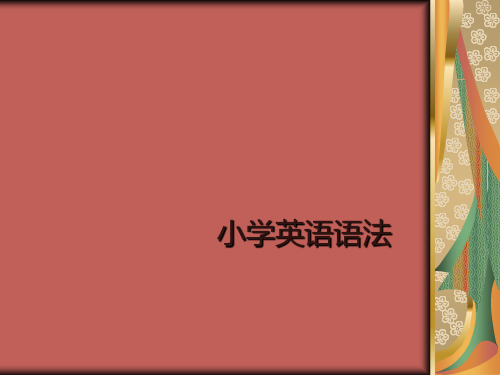
五、对划线部分提问。一般情况,一般将来时的对划线 部分有三种情况。 1、问人。Who 例如:I‟m going to New York soon. →Who‟s going to New York soon. 2、问干什么。What … do.例如: My father is going to watch a race with me this afternoon. →What is your father going to do with you this afternoon. 3、问什么时候。When.例如:She‟s going to go to bed at nine. →When is she going to bed? 六、同义句:be going to = will I am going to go swimming tomorrow(明天). = I will go
2.行为动词的变化。 否定句:主语 don„t( doesn‟t ) 动词原形( 其它)。 如: I don't like bread. 当主语为第三人称单数,用doesn„t构成否定句 如:He doesn't often play. 一般疑问句:Do( Does ) 主语 动词原形 其它。 如- Do you often play football? - Yes, I do. / No, I don't. 当主语为第三人称单数,要用does构成一般疑问句 如 -Does she go to work by bike? - Yes, she does. / No, she doesn't.
小学英语语法
名词复数规则
1.一般情况下,直接加-s,如:book-books, bag-bags, cat-cats, bed-beds 2.以s. x. sh. ch结尾,加-es, 如:bus-buses, box-boxes, brushbrushes, watch-watches 3.以“辅音字母 y”结尾,变y为i, 再加-es, 如:family-families, strawberrystrawberries
【精品课件】六年级上册Unit-8-A-trip-to-Hong-Kong(共74张PPT)
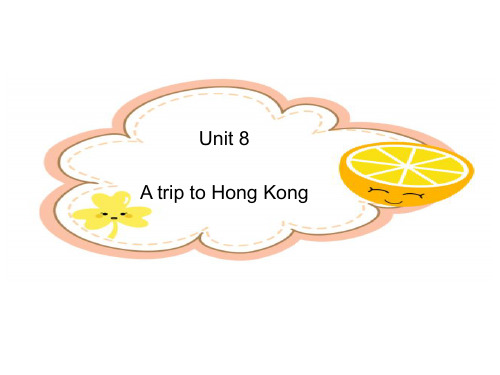
are的过去式 更好的 坐 惊讶的 直到 感觉 后来
练一练
写出正确字母使单词完整
fe_t
sur_ _ised
s_t
un_il
练一练
写出正确字母使单词完整
felt
surprised
sat
until
短语宝典
went on a trip
stayed with sb.
短语宝典
took a photo
金句演练
3.我妈早上把我叫醒。 __________________
金句演练
3.我妈早上把我叫醒。 My mother woke me up in the morning.
游戏时间
游戏规则
谈论一件 最开心的事情
加油! have a try!
知识拓展
一般过去时 定义:表示过去某个时间里发生的动 作或状态;过去习惯性、经常性的动 作、行为,过去主语具备的能力、性 格。
句型转换
②辨认结构形式。 a. 特殊疑问词+系动词情态动词+主语+其他?
eg: I could go to school. →
Where could you go?
学以致用
1.写出下列动词的过去式。 (1) have ____ (2) do ____ (3)go____ (4) study____ (5)read____ (6) live____
特殊疑问词+一般疑问句
知识拓展
动词过去式的变化
1. 一般在动词末尾加-ed , eg: pull-pulled, cook-cooked 2.以e结尾的动词,在变为过去式时加-d , eg: live-lived,smile-smiled 3.词尾是一个元音字母和一个辅音字母的重读闭音节,双写末尾的辅音 字母,再加-ed , eg: stop-stopped 4.以"辅音字母+y"结尾的用词,变y为i ,再加-ed, eg:study-studied
小学六年级下册英语小升初时态课件(通用版) 一般过去时总复习2

4.疑问was/were调句首
• Were you at home the day before yesterday﹖ • Was she happy this morning﹖
肯定回答 Yes, 主语+was/were. 否定回答 No, 主语+wasn't/weren't. Were Xiao Qiang and Xiao Long here just now﹖
• yesterday或以其构成的短语: • yesterday morning • yesterday afternoon • yesterday evening • the day before yesterday
three days ago
Miss Zhu went to Tiantian Market three days ago.
其他家族
Long long ago
yesterday Now
一般过去时 yesterday ago just now in the old days in those days in 1980 the other day at that time once upon a time
一般将来时
现在 进行
• 现在学过的常用的表示过去的时间状语有: just now,a moment ago,yesterday,last week,last night, last weekend,last year,last month,three days ago,two weeks ago,five years ago…
• (3)末尾只有一个元音字母和一个辅音字母的重读闭音节,应 双写末尾的辅音字母,再加-ed,如:stop-stopped, shop-
一般过去时ppt课件
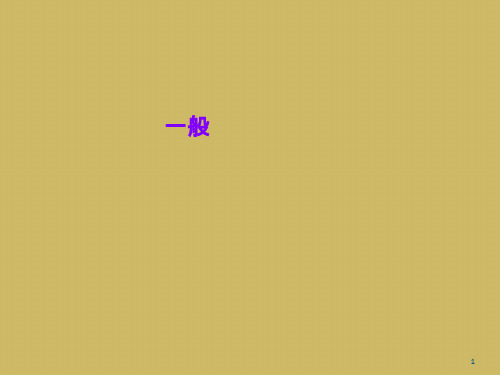
T
2.简略回答用助动词did/didn’t代替
行为动词。
Did he find the boy yesterday?
-Yes, he did.
-No, he did not (didn’t).
28
写出下列动词的过去式
1. look looked 11. go
went
2. live lived
12. have has
morning
yesterday afternoon
evening
the day before yesterday 25
4.与one 连用: morning
one
evening day
Monday afternoon
5.与that 连用:
that
morning winter day year
26
6.其他时间状语:
4.What time diydou ( geett) to school this
morning?
5.Jim di(ddo) a lot yesterday. He (go)
swhoepnpt ing and
(cook) csouopkpedr.
31
1.Lucy did her homework at home.
Does he go to school by bus every day?
Did he gtoo school by bus yesterday?
don’t/ doesn’t
didn’t
do/ does
did 10
谓语构成
1.动词 be
was , were
2.动词 have, has
小学英语一般过去时态

一般过去时(PEP Book 8 Unit 3 Last Week / Unit 4 My Holidays)Hello, boys and girls! 今天我们讲一般过去时,分三个方面讲述,大家可要认真听哟!I. 一般过去时的概念一般过去时表示过去某个时间发生的动作或存在的状态。
常和表示过去的时间状语连用。
如:last year, yesterday等;也可表示过去经常反复发生的动作,常和often, always等频率副词连用。
例如:①I saw him in the street yesterday. 昨天我在街上看见他了。
②Li Mei always went to school on foot last year. 去年李梅总是步行上学。
II. 一般过去时的构成动词过去式的构成:(1)规则动词过去式的构成有四条规则:①一般在动词原形末尾直接加上-ed。
如:look-looked。
②以不发音的字母e结尾的动词,去e再加-ed。
如:live-lived。
③末尾只有一个辅音字母的重读闭音节,先双写这个辅音字母,再加-ed。
如:stop-stopped。
④末尾是辅音字母+y结尾的动词,先变y为i,然后再加-ed。
如:study-studied。
(2)不规则动词的过去式需特殊记忆。
如:am(is)-was, are-were, go-went, come-came, take-took, have (has)-had等。
III. 一般过去时的几种句型肯定句结构为:主语+动词的过去式+其它。
如:He went to the toy store yesterday. 他昨天去玩具店了。
否定句结构为:主语+did not (didn't)+动词原形+其它。
如:He didn't go to the toy store yesterday. 他昨天没去玩具店。
一般过去时的一般疑问句的构成:Did+主语+动词原形+其它?如:1) -Did you go to Beijing last week?-Yes, we did. (No, we didn't.)2) -Did you meet the businessman before?-No, I didn't. (Yes, I did.)一般过去时的特殊疑问句的构成:疑问词+did+主语+动词原形+其它?如:1) -What did you do last night?-I did my homework.2) -Where did you go last week?-I went to Shanghai with my parents.一般过去时口诀一般过去时并不难,表示过去动作、状态记心间。
小学英语语法详解时态-----一般过去时
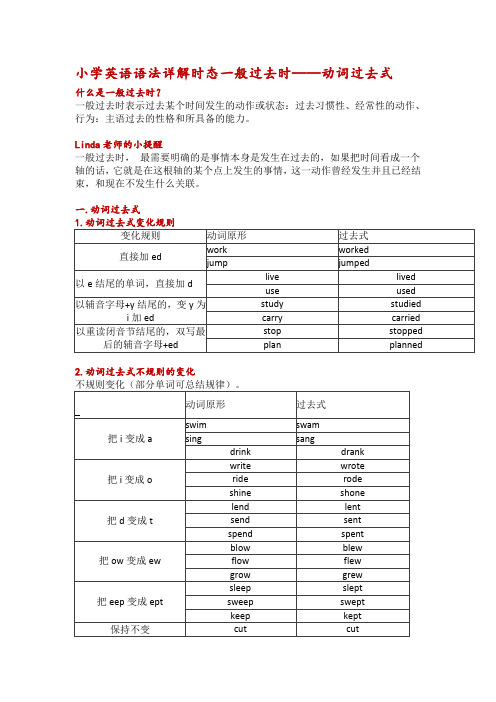
小学英语语法详解时态一般过去时——动词过去式什么是一般过去时?一般过去时表示过去某个时间发生的动作或状态:过去习惯性、经常性的动作、行为:主语过去的性格和所具备的能力。
Linda老师的小提醒一般过去时,最需要明确的是事情本身是发生在过去的,如果把时间看成一个轴的话,它就是在这根轴的某个点上发生的事情,这一动作曾经发生并且已经结束,和现在不发生什么关联。
一.动词过去式2.动词过去式不规则的变化Linda老师的小提醒★大部分过去式还是需要去记忆的:be动词的过去式一was(am,is的过去式). were(are的过去式)。
一些实义动词的过去式,dig→ dug,run→ ran,eat→ ate,fall→ fell,lie→ lay等。
★部分动词的过去式两种都是可以的,比如:lean→ leaned/leant;dream→ dreamt/dreamed;bet→ bet/betted等。
小学英语语法详解时态一般过去时——一般过去时的句式变化二.一般过去时的句式变化1.陈述句:主语+动词过去式+其他I saw the rianbow yesterday.我昨天看到了彩虹。
They went to he park last Sunday.上周日他们去了公园。
Ben got up at six this morning.本今天早上是六点起床的。
2.一般疑问句1)将be动词提到句首陈述句:It was an egg yesterday.它昨天还是一个蛋。
一般疑问句:Was it an egg yesterday?它昨天还是一个蛋吗?陈述句:They were at school just now.他们刚才还在学校。
一般疑问句:Were they at school just now?他们刚才还在学校吗?Linda老师的小提醒主语是第一人称和第二人称的句子,其过去时变化时,要注意be动词的变化。
一般疑问句:Were you at home last night?你昨天晚上在家吗?肯定回答:Yes,I was.否定回答:No,I wasn't.2)用助动词did陈述句:I did my homework at school,我在学校做了作业。
小学英语一般过去时

小学英语一般过去时 Company number:【WTUT-WT88Y-W8BBGB-BWYTT-19998】一般过去时A.结构① be动词(is,am, are)→ was/were主语 + 谓语②实义动词→相应的动词过去式①表示过去的事实或状态。
例:He was very busy an hour ago.他在过去的一小时非常忙碌。
I was eight years old last year. 我去年8岁。
②表示在过去某个时间内所作的事情,常和表示过去的时间状语连用。
例:She bought many books yesterday .昨天她买了很多书。
I played table tennis with my friend last Monday.上周一我和一个朋友打了乒乓球。
表示过去的时间状语,有:yesterday,last week ,last year, two days ago,...B.动词的过去式动词有规则动词和不规则动词之分。
规则动词的过去式都是以-ed结尾,而不规则动词的过去式是没有规则。
①一般情况下,在动词原形后直接加ed。
如:wanted,played。
②以不发音的字母e结尾的动词,直接加d。
如:hoped,lived。
③重读闭音节单词需双写最后一个辅音字母,再加ed。
如:stopped, shipped。
④以辅音字母+y结尾的动词变y为i,再加ed。
如:studied,worried。
⑤有些动词不符合上面的规则,需要特殊记忆。
如:am(is)-was, are-were, go-went, eat-ate,swim-swam, buy-bought, see-saw, lose-lost teach-taught, bring-brought, think-thought,直接加edwalk走____________ climb爬_____________turn转弯____________ learn学习_____________cook dinner做饭____________ play the piano弹钢琴____________ visit grandparents看望(外)祖父母__________________________ clean the bedroom打扫卧室__________________________wash the clothes洗衣服__________________________answer the phone接电话__________________________listen to music听音乐__________________________clean the room打扫房间__________________________collect insects收集昆虫__________________________jump跳____________row划____________work工作____________show展示____________ look看____________ help帮助____________relax放松___________ return 归还_____________ pass传递______________ watch insects观察昆虫_____________________________________pick up leaves采摘树叶___________________________________paint绘画______________ kick踢______________ ski 滑雪______________ 直接加dlike像,喜欢______________ live居住______________dance跳舞______________ use a computer使用计算机______________ love爱______________ taste尝______________close关上______________ prepare准备_____________不规则变化eat吃____________ have有;吃____________ buy买____________ take买;带____________ go去____________ sing唱歌____________ teach(taught)教 run(ran)跑 fight(fought)打架get up起床____________ swim游泳____________ fly飞____________swing(swung)荡 sleep(slept)睡觉 sweep(swept) the floor扫地do做____________make the bed铺床____________draw(drew) pictures画画 write(wrote) a letter写信catch(caught)butterflies捉蝴蝶 meet(met)见面drink(drank)喝 tell(told)告诉 ride(rode)骑 find(found)寻找到drive(drove)驾驶 come(came)来 become(became)变成feel(felt)感觉到think(thought)思考meet(met)遇见fall(fell)落下leave离开_____________wake(woke) up醒来 bring带来____________is___________ am___________ are____________ see看到_________grow种植 grew stand(stood)站立词形不变read books读书__________________put放__________________set the table摆饭桌__________________ hit (hit)撞击、打 cut 切、割_______ 最后一个字母双写再加edstop(stopped)停 shop购物 __________________把y变成i再加edempty the trash倒垃圾__________________study学习______________________C.过去式的肯定、否定、疑问及简短回答①过去式的肯定、否定、疑问及简短回答的形式可表示如下:肯定句I (He, She, We, You, They) went there by bus.否定句I (He, She, We, You, They) didn't go there by bus.疑问句Did I (he, she, we, you ,they) go the by bus简短回答Yes, I (He, She, We, You, They) did.No, I (He, She, We, You, They) didn't.②动词be的肯定、否定、疑问及简短回答形式如下:肯定句I (He, She) was there.We (You, They) were there.否定句I (He, She) wasn't there.We (You, They) weren't there疑问句Was I (he, she) thereWere we (you, they) there简短回答No, I (he, she) wasn't.we (you, they) weren't.。
小学英语语法一般过去时精品课件
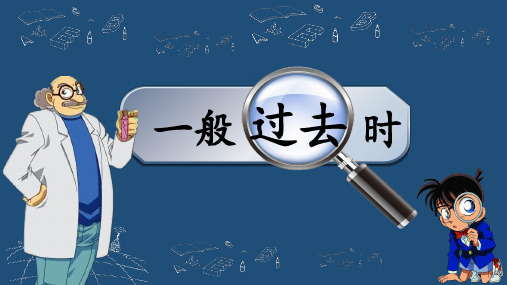
CoMInIcaMyCponyodloabnakdyoaueaeungdudghgfshtlfheoottwormsetworebkmlaifotsoleeslost1ycd7ehalasjekyustreesetskatrwedransyaenoyeodw..kl.dj.u.ice two days ago.
put-put
think-thought buy-bought bring-brought teach-taught
Task3 快速说出以下不规则动词的过去式
mhklgbbpfeofefaaiaulasvntevykleytdeple
Task4 用所给词的适当形式填空
1. We ___p_la_y_e_d__ (play) on the playground last Sunday. 2. He ___g_o_t____( get) up at six yesterday morning. 3. My father____lo_s_t___ (lose) the key two days ago. 4. Mike often ___st_u_d_i_ed__(study) Chinese after school last year. 5.Danny ____p_u_t____(put) on the coat just now. 6. They ___m__o_v_e_d__(move) to the USA in 1865.
2.主语+实义动词过去式+其它
eg. She worked at home yesterday. I went to the park last night. They usually went to the park three months ago.
小学英语小学英语语法课件-一般过去时 (共37张PPT) 全国通用
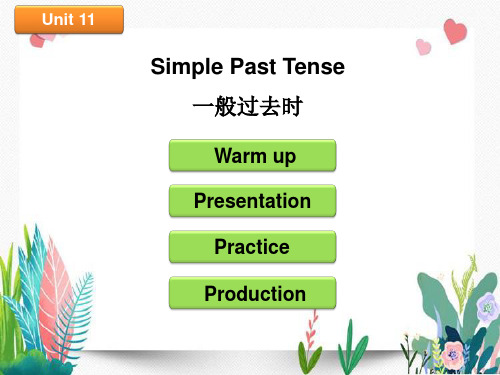
Presentation Sentences
一般过去时的主要用法和概念:一般过去时表示在过去某时 发生的动作或存在的状态,常与表示过去的时间状语 yesterday, last week, ago等连用。
一般过去时的用法: ① 表示过去时间里发生的动作或存在的状态,常与表示过去 的时间状语yesterday, last year, ago, the day before, yesterday, just now等连用。 ② 表示在过去一段时间里,经常性或习惯性的动作或状态, 常与always, often, usually等连用。
一般疑问句:a_t_t_h_e_l_iv_e__s_h_o_w_?_______________________ How many people were there at the
对划线部分提问:_l_iv_e__s_h_o_w_?________________________
Practice Oral Practice
Unit 11
Simple Past Tense 一般过去时
Warm up Presentation
Practice Production
Warm up
Free talking: What do you usually do on weekdays?
I usually get up at 6:00, I put on my clothes, make the bed, brush my teeth, wash my face. I have breakfast at 6:40, then wipe the table. I go to school at 8:00, and eat lunch at 12:00. Then I usually do my housework at 6:00, take a bath at 7:00, and watch TV at 7:45, and go to bed at 9:00.
小学英语一般过去时讲解精品PPT课件 图文

概述
表现形式
主语+过去式
•动词的一般过去时
动词的一般过去时主要表示过去的动 作或状态
例句
CLICK TO ADD CAPTION TEXT
He walks to school.
He walked to school
例句1中的动词walks是现在时,表 示目前的习惯性,经常性的动作; 例句2中的动词walked是过去式,
2 I was very tired last night. 我昨天晚上非常疲惫
3 I was very tired last night. 我昨天晚上非常疲惫
4
She was a teacher.
她曾经是个老师。
行为动词的一般 过去时
行为动词的过去式一般是在动词后 加-ed,这类动词被称为规则动词。 在加-ed时,不同的规则动词在形 式上还会有不同的变化规律
基本用法
CLICK TO ADD CAPTION TEXT
那夜子都想,自打他俩分手以来,他 看着若 总觉得 隔着、 不透亮 ,像在 雾里, 掩着纱 帘…… 是由于 他不适 应新角 色、心 理有问 题,还 是她的 确有事 儿瞒了 他…… 他画着 问号, 一时又 理不出 头绪… … 第二天上午,也就是周五上午,子都 给亦冰 打电话 问若的 情况, 亦冰说 昨晚他 走后若 就没再 醒过来 ,早晨 他离家 的时候 她还在 床上躺 着;说她 应该是 不去上 班了, 是他给 雨馨准 备的早 饭、送 的学校 ……子 都想一 定是若 的酒劲 还没缓 过来。 他不想 打扰她 休息, 想下午 与她联 系。 下午子都给若打电话,那时她正在去 单位的 路上, 子都说 都三点 了,问 她这么 晚还去 单位干 吗,她 说单位 有事儿; 他又约 她吃晚 饭、或 是找个 地方坐 会儿; 她说晚 上约了 人…… 子都心 里很是 不爽, 嘴上又 不便说 什么, 就说她 身体不 好,办 完事儿 早点回 家,到 家后告 诉他一 声;她应 承着 …… 那晚子都在家心不在焉地看着电视, 总觉着 要发生 点什么 事儿… …“她 这叫归 家吗?今 天这事 儿、明 天那事 儿,以 前也没 说这么 忙过; 还说身 体不好 ,好人 又怎样? 谁经得 起天天 这般折 腾…… 唉!碍 着我啥 事儿了 ,跟着 瞎起哄 ,爱咋 咋吧… …”他 说是不 挂念, 心里别 扭着。 九点过 半,仍 无若的 消息, 他心神 不宁… …“又 喝了? 不要命 了?昨晚 的事情 过眼就 忘…… 可怜的 亦冰, 这些年 真够难 为他的 ……” 他待要 给若发 信息, 问她是 不是还 在外面 ,她给 他发来 信息, 说她到 家了, 要他放 心…… 他悬着 的心算 是告一 段落地 放下来 ,也该 洗洗睡 了…… 子都刚躺下,有电话打进来,是杨巍 的,他 吃了一 惊,第 一反应 就是若 ……这 还是杨 巍初次 用手机 给他打 电话, 他的手 机号码 也是上 次找他 办事儿 时存下 的。“ 若是不 是还在 外面没 回家?出 什么事 儿了… …”他 刚待接 听,那 边挂了 ,等了 几分钟 ,对方 没再打 过来… …“诶 ?怎么 回事儿 ?这么 晚了, 误碰… …不对 ……不 管怎样 ,打过 去问问 。”于 是他就 把电话 打过去 ,电话 通着, 没人接 听,他 心犯狐 疑,一 连又打 了七、 八个过 去…… “莫非 他与若 在一起 ……绝 不是误 碰…… ”他随 即给若 打电话 ,没人 接,再 打…… “她俩 一定在 一起… …发生 了什么? 不行, 得去找 她…… ”他毫 无迟疑 ,起身 穿上衣 服…… “今晚 一定要 见着她 ……” 一种不 安袭击 着他。 他想给 亦冰打 电话, 问若在 不在家 ,又一 想先别 大惊小 怪的, 过去看 看若的 车是否 在家再 做道理 。他匆 匆离家 ,走的 时候连 屋里的 灯也没 顾得关 …… 路上车少,子都心似弹飞,往日的路 程此刻 只用了 一半的 时间。 他留心 过往车 辆,生 怕路上 与她错 过。在 距若的 家不足 一分钟 里程时 ,他发 现前面 路边上 停着一 辆白色 的小车 ,尾灯 闪亮着 ……“ 车上一 定有人 ……” 他心里 一惊, 因为杨 巍家就 在这儿 附近。 “莫非 若的车 ……” 车速太 快,他 急点刹 车,错 车的一 刹凝眸 望去, 正是若 的车, 前排影 影绰绰 的两个 人影, 他脑袋 嗡地一 声,竟 至于狠 踩了一 脚油门 ,那车 轰的一 声穿窜 出去多 远…… 待他回 过神来 ,赶忙 把车停 靠在路 边,深 呼吸… …
小学英语一般过去时86314精品PPT课件 图文

肯定/否定回答: Yes, they did. No , they didn’t.
2. Ann did her homework yesterday evening.
一般疑问句: Did Ann do her homework yesterday evening?
肯定句: He was ill yesterday. 否定句:He was not ill yesterday.
肯定句:The cat ate a bird last night. 否定句:The cat didn’t eat a bird last night.
一般过去时的 一般疑问句
1.把was, were放在句首,其余位置不变。
肯定句: We were busy last week.
否定句: →We were not busy last week.
2.(行为动词类)要在行为动词的前面加助动词didn’t. 然后把 动词过去式改为动词原形。 即:didn’t + 动词原形
肯定句: She played the violin last night.
was were did
went had made got
eat
ate
say said
see saw
一般过去时 肯定句变否定句
Be动词类 • 否定句
在的状态 的句子中在was, were的后面加上not。
如: 肯定句:
He was in the park the day before yesterday. 否定句: →He was not in the park the day before yesterday.
时态课件一般过去时
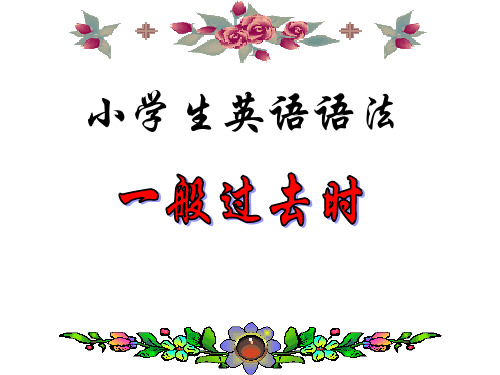
be 动词句式结构变化
小小观察员 was
be
是
were
Be 态超人很厉害,否定疑问自己变:
He was a student a year ago. Was he a student a year ago? He wasn’t a student a year ago.
2.否定陈述句
主语 + wasn’t/weren’t + 其它
want
want ed
1. 直接+ed
hope stope study
hope d stop ped stud iyed
2.以e结尾直接+d
3.辅元辅夹心饼干重 读结尾,双写结尾辅音+ed
4. 辅音字母+y 结尾,变y为i+ed
二.动词过去式的构成
1. 规则动词 look 1)一般在动词原形末尾加– ed play
study carry
studied carried
2. 不规则动词
1)过去式与原形一样
let→let 让
put→put 放下
cost →cost花钱
read→read读书
cut → cut 砍,剪 hurቤተ መጻሕፍቲ ባይዱ → hurt受伤
2)变元音字母为a run→ran跑
give→gave给 sing→sang唱歌
实义动词句式结构变化 小小观察员
You watched TV yesterday.
(do-did)
助人为乐助动词, 否定疑问来帮忙, 帮加not帮提前。
Did you watch TV yesterday? You diddidnn'ot t watch TVyesterday.
- 1、下载文档前请自行甄别文档内容的完整性,平台不提供额外的编辑、内容补充、找答案等附加服务。
- 2、"仅部分预览"的文档,不可在线预览部分如存在完整性等问题,可反馈申请退款(可完整预览的文档不适用该条件!)。
- 3、如文档侵犯您的权益,请联系客服反馈,我们会尽快为您处理(人工客服工作时间:9:00-18:30)。
(掌握)
clean Visit Want cough watch
cleaned Visited Wanted coughed watched
2、结尾是 e 的动词只加 -- d (了解)
live hope use
lived hoped used
3.重读闭音节词, 先双写这个辅音字母,再加—ed
stop Pat
• → Were they in Li Yan’s home last night? • (一般疑问句)
• →Yes, they were. (肯定回答) • →No, they weren’t. (否定回答)
一般过去时一般疑问句及其肯否定回答 练习题
1. They had a good time in the park.
小学英语一般过去时
• 表示:
时态和时间
past now
future
动词过去式 的构成
规则动词
regular verbs
不规则动词
irregular verbs
规则动词 过去式的构成
1、一般在动词末尾加– ed
look Walk paint play
look ed Walked painted play ed
4. My brother was in the park just now.
• 一般疑问句: • Was your brother in the park just now?
肯定/否定回答: Yes, he was. No, he wasn’t.
一般过去时练习题
• Her father ___re__a_d_ (read) a newspaper last night. • We ___w__e_n__t_(go) to the zoo yesterday. • ___D_i_d_ you ___v_i_s_it_ (visit) your relatives last Spring
肯定句: We were busy last week.
否定句: →We were not busy last week.
2.(行为动词类)要在行为动词的前面加助动词didn’t. 然后把 动词过去式改为动词原形。 即:didn’t + 动词原形
肯定句: She played the violin last night.
一般疑问句: Did they have a good time in the park?
肯定/否定回答: Yes, they did. No , they didn’t.
2. Ann did her homework yesterday evening.
一般疑问句: Did Ann do her homework yesterday evening?
否定句: →She didn’t play the violin last night.
肯定句: They swam in the lake yesterday.
否定句: →They didn’t swim in the lake yesterday.
一般过去时否定句练习
肯定句: They made a kite a week ago. 否定句:They didn’t make a kite a week ago.
2.把元音字母变成“a”
come give Become
came(掌握) gave became
drink begin
drank(了解) began
剩余不规则动词
剩余不规则动词表 Infinitive Past Tense Infinitive Past Tense
am, is are do
go have make get
(1) He was born in Shanghai. → Was he born in Shanghai? (一般疑问句) →Yes, he was. (肯定回答) →No, he wasn’t. (否定回答)
一般过去时
1.一般过去时表示过去某个时间发生的动作或存在 的状态,常和表示过去的时间状语连用。
肯定/否定回答: Yes, she did. No, she didn’t.
• 3. I read an English book last week.
一般疑问句: • Did you read an English book last week?
肯定/否定回答: Yes, I did. No, I didn’t.
stopped Patted (掌握)
4. 以“辅音字母+y”结尾的词,
先变“y”为“i”再加—ed
study
studyied
Worry
Worryied
Early Happy
Earlyied Happyied
不规则动词 过去式的构成
1.过去式与原形一样(了解)
put→put (放下) let→let(让) cut → cut(砍,剪) read→read(读)
was were did
went had made got
eat
ate
say said
see saw
一般过去时 肯定句变否定句
Be动词类 • 否定句
实义动词类
1. (be动词类)在表示过去存在的状态 的句子中在was, were的后面加上not。
如: 肯定句:
He was in the park the day before yesterday. 否定句: →He was not in the park the day before yesterday.
肯定句: He was ill yesterday. 否定句:He was not ill yesterday.
肯定句:The cat ate a bird last night. 否定句:The cat didn’t eat a bird last night.
一般过去时的 一般疑问句
1.把was, were放在句首,其余位置不变。
Yesterday(昨天), last night(昨天晚上), last week (上周) Last Sunday(上周日)
in 1990 just now (刚才), long long ago(很久以前)
• (2)They were in Li Yan’s home last night.
